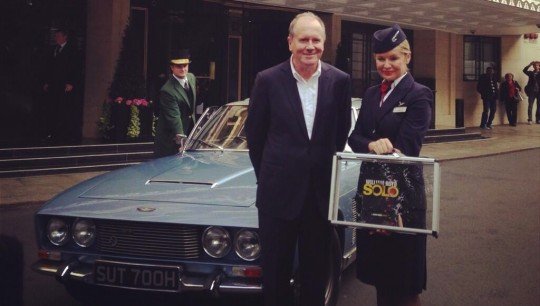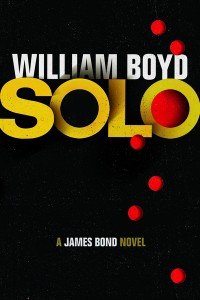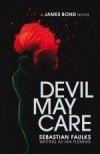Sixty-one years after his creation, James Bond lives on through the films starring Daniel Craig, and the enduringly popular books by Ian Fleming. However, a select band of authors have also been working to carry on the spy’s story, including Kingsley Amis (Colonel Sun, 1968), Sebastian Faulks (Devil May Care, 2008) and Jeffery Deaver (Carte Blanche, 2011). William Boyd is the latest best-selling author to be commissioned by the Fleming estate to continue 007’s adventures and his novel, Solo, was published yesterday (26 September).
Popular with a president
Bond may not be a character we often turn to on CFL, but Fleming’s spy is a great lone hero in a tradition running from Richard Hannay in The Thirty-Nine Steps to Lee Child’s Jack Reacher. Bond’s had a huge influence on modern thriller authors who revere his books as classics, and when the novels first became hits he was popular with everyone from Raymond Chandler to John F Kennedy. Fleming had a penchant for inflicting cruelty and brutality on his characters and the amoral tone of some of the books is certainly comparable to some of the harshest noir novels.
Boyd, the author of Any Human Heart and spy novel Restless, attended a 25 September launch at the Dorchester Hotel in London – the scene where the book begins. Seven Jensen Interceptor sports cars transported copies to Heathrow Airport, destined for Edinburgh, Amsterdam, Zurich, New Delhi, Los Angeles, Cape Town and Sydney. The cities all have connections with Bond or Boyd, and the author showed his expertise on the literary spy at an event held at the Southbank Centre in London last night. Early reviews have been mixed but the Fleming family has embraced Boyd’s contribution.
“Will’s knowledge of James Bond, and indeed my uncle Ian, is incredible,” Fleming’s niece Lucy told the Southbank audience. “Solo is an excellent novel with all the essence of Ian’s Bond and more.”
Boyd is certainly a fan of Bond. He demonstrated his knowledge as he pointed out to an audience member that the character Q was an invention of the films (though Q Branch is mentioned in the books), and he recalled devouring Fleming’s novels as a schoolboy. “The great thing he did was in the creation of character,” said Boyd. “He is a far more complex and nuanced character in the novels than he is in the films. Bond’s complexities make him more than the blunt instrument super-spy that we might think of him.”
Hero with a hangover
Solo is set in 1969, when Bond becomes embroiled in a scheme to avert a civil war in a fictional west African state. He’s 45 and the novel is set within the chronology Fleming outlined in You Only Live Twice, unlike Deaver’s book, which updated the character to the contemporary world of post-9/11 terrorism. Boyd’s novel begins with his hero nursing a hangover following an evening of fine dining at the Dorchester; his food and alcohol intake are richly detailed, just as Fleming chronicled the jet-set luxury enjoyed by 007 in the early 1950s at a time when most readers were subject to post-war austerity.
“He lifted the lid on that world that nobody knew anything about at all,” said Boyd. “By reading a Bond novel you were given temporary access to that club.”
Boyd suggested that Bond is a damaged character, just like his creator. Fleming, a spy in naval intelligence during World War II, had an unhappy marriage and even literary success did not seem to please him. He smoked dozens of cigarettes a day and drank heavily, as Bond does in the books. “The amount of booze he consumes [in Solo] is mind-boggling,” said Boyd. “I was like an anxious wife married to an alcoholic.”
“Part of the fun is seeing those old habits that nobody took exception to at all,” he added.
Bond Women not Girls
The author made a point of referring to Bond Women rather than Bond Girls – he sees the latter as an invention of the films – and his favourite female characters in the books are Honeychile Rider in Dr No and Tatiana Romanova in From Russia With Love, which he nominated as his favourite Bond novel. “It’s a classic spy story,” said Boyd. He argued that Fleming’s 12th and final novel, The Man With the Golden Gun, is underrated though conceded that Fleming was an uneven writer.
Solo fills in Bond’s background as a young soldier at the end of WWII based on references in the Fleming novels, and Boyd said he knocked some of the rough edges off the character, who had some politically incorrect views in the original stories. In Solo, Bond is living off the King’s Road – perhaps the most fashionable street in Swinging 60s London – and Boyd decided that the ageing spy would have changed with the times. He also heads to Washington at a time of political upheaval during the Vietnam War.
Psychopathic Bond villain
Of course, Bond has to have a villain and in Solo his arch-enemy is mercenary Jakobus Breed, a soldier who fought in the Rhodesian Bush War and had half his face destroyed. “He’s a really nasty, psychopathic mercenary soldier of the sort one could have encountered then or indeed now,” said Boyd. “He’s not a Blofeld or somebody running some global crime organisation, he’s just a really nasty piece of work fighting a nasty little African war. He’s a proper opponent for Bond.”
In fact, Boyd’s approach was for realism rather than the fantasy espionage world of the films. “I wanted to write a realistic novel about a real person, I didn’t want to write a fantastical, grotesque or totally implausible spy caper,” he explained. Fans can be assured that familiar faces such as M, Felix Leiter and Moneypenny do feature in the book.
As for the recent post-Fleming novels, Boyd said he was impressed with Devil May Care by Sebastian Faulks, which he read after completing Solo.“He certainly knows his Bond as well as I do,” said Boyd.
Based on this engaging and illuminating appearance by Boyd discussing his mission to write a 007 adventure, that’s quite a compliment for a fellow author.















